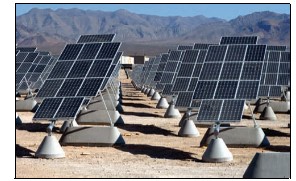 — Busso von Alvensleben, Deputy Director & Coordinator - Energy, KfW, India
— Busso von Alvensleben, Deputy Director & Coordinator - Energy, KfW, India
KfW has been actively supporting the Indian renewable energy sector through
development loans and lines of credit. The German government-owned financial
institution recently committed

1,600 crore for the massive Sakri solar power project
in Maharashtra, making it KfW's single-largest exposure to any solar project in the
world.
Busso von Alvensleben, in this interaction with
Venugopal Pillai, takes us
through KfW's long association with India and asserts that the institution will continue
to strengthen its co-operation and support to India's renewable energy pursuits.
Tell us more on the recent $356-million loan sanctioned by KfW for the
Sakri solar power plant. Is this KfW's biggest exposure to a single solar
power project?
The German Government-owned development bank KfW signed a loan
agreement amounting to €250 million (approximately

1,600 crore) with
the government of India to finance a 125-mw solar PV power plant to be
constructed by Mahagenco at Shivajinagar, Sakri, in the Dhule district of
Maharashtra with the option for further expansion by 25 mw. The Sakri solar
power plant will be the largest of its kind in the world. Its total costs are
estimated at €370 million (

2,370 crore) and will be funded by the loan
amount from KfW and the Maharashtra state government's contribution.
This is KfW's biggest exposure to a single solar power project
What is your view on India's solar power potential and the country's
mission of attaining 1 GW of solar capacity by 2013? Would solar be a
key area for KfW in the Indian
renewable energy sector?
India has one of the world's highest
solar insolation rates. Given the
successes in the commercialization
of the wind sector, India has good
potential to realize its solar potential.
The challenge for India is to convince
consumers to pay higher electricity
tariffs to accommodate the comparatively high costs of solar plants.
KfW is interested in an expansion of its solar portfolio. Under the
mandate of the German Government, KfW Development Bank is
financing development loans with Indian Government agencies as
loan recipients. The German Ministry of Development Cooperation
has approved grant funds for further feasibility studies for several
large scale solar thermal plants. The Indian private sector is
benefiting from credit lines under loan agreements signed with
Indian government financing institutions, such as IREDA. Besides,
DEG Invest, a member of KfW Bankengruppe, is financing privatesector
investments in India.
We understand that KfW has supported India's renewable energy sector
for over a decade now. How has been the journey?
Here are some examples of KfW support to renewable/clean energy
projects in India:
- Solar Upgrading of the NTPC Anta Gas Power Plant -
Technological innovation: First solar-thermal power plant in Asia;
Operator: NTPC Ltd Anta Gas Power Project, Baran district, Rajasthan
- Barrier Removal in Biomass Power Generation in India; (Partner:
IREDA). Project purpose: Financing of model investment projects that
serve as a reference for future funding from commercial banks
- IREDA
Sustainable Energy Programme: Objective: To promote investments in
renewable energy and energy efficiency projects, by providing
sustainable financing through IREDA and to strengthen IREDA in
fulfilling its promotional role
- MSME Energy Efficiency Programme.
(SIDBI): Project purpose: Promoting higher energy efficiency or
energy saving related investments by MSMEs, thereby contributing
to energy efficient industrial production, thus to ecologically
sustainable economic growth in India. The programme will also help
SIDBI with its endeavors to become a Green Development Bank for
the MSME sector.
 What is KfW's current exposure to
India's renewable energy sector?
What is KfW's current exposure to
India's renewable energy sector?It is around €1.1 billion . KfW
Development Bank is financing
development loans with Indian
Government agencies as loan
recipients only.
Tell us more on the lines of credit
offered to private Indian companies in
the field of renewable energy and
energy efficiency.
As mentioned KfW refinances credit lines offered by Government of
India's financing institutions, such as IREDA and SIDBI.
In the context of renewable energy, how does KfW's exposure in China
compare with that in India?
KfW under mandate of the German Ministry of Development
Cooperation has supported China in the expansion of the use of
renewable energies, for the construction of solar energy systems in
Yunnan and Xinjiang. However, the recent engagement in India for a
125-mw solar PV power plant breaks all records.
Given that renewable energy along with energy efficiency will play an
important role in India, how do you see KfW's association growing in the
coming years?
India has favourable resource endowment for solar, wind,
biomass and hydropower. Hence, the potential in renewable energies is
enormous. Consequently, we will continue and deepen our financial
cooperation with India in the field of renewables in the coming years.